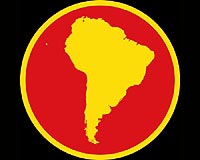| . |  |
. |
Beijing (AFP) April 10, 2010 Chinese President Hu Jintao is to sit down with US President Barack Obama next week in Washington as the two sides look to turn the corner on months of bickering. The presence of Hu in the US capital is a sign that relations are recovering from a chill, which set in after Obama visited Hu in Beijing last November, over issues including the value of the yuan, trade and Internet freedom. A surprise visit to Beijing on Thursday by US Treasury Secretary Timothy Geithner, who opted to discuss some of the trouble spots in person after pushing back a potentially sensitive report, also served to soothe tensions. "We believe we can address challenges in our relationship," Chinese Vice Foreign Minister Cui Tiankai told journalists at a briefing on Hu's trip, which will also include several stops in Latin America. "Certainly China and the United States may have different views on many issues, including the world economic crisis and trade, but we can't overlook the fact that both also have shared interests." The two countries are working together to resolve the standoff over Iran's suspect nuclear programme, and are also partners in stalled negotiations to end North Korea's atomic drive. Just over a week ago, Obama held a rare one-hour telephone conversation with Hu that "underscored the importance of working together to ensure that Iran lives up to its international obligations", the White House said. The two leaders will likely meet on Monday on the sidelines of an international summit on nuclear security, the White House has said. "Beijing's announcement that president Hu will attend the April nuclear security summit indicates that Beijing is calming down," said Zhu Feng, an expert on US relations at Peking University's School of International Studies. "Despite a residual and marked dissatisfaction, China isn't willing to derail the relationship with Washington, and instead wants to leave the rift behind and move forward with collaboration between the two powers," Zhu said in a posting on the Asian Security Initiative blog. Earlier this year, relations between the US and China -- the world's biggest and third-largest economies -- hit a rough patch after Obama in January approved the sale of 6.4 billion dollars in arms to Taiwan. The following month, he met with the Dalai Lama, the exiled Tibetan spiritual leader, at the White House. Washington and Beijing have also gone back and forth over Google's China exit, which was prompted by cyberattacks and Internet censorship, as well as the yuan, which the US says must be boosted to resolve global trade imbalances. Geithner tackled the yuan issue with Chinese Vice Premier Wang Qishan, the cabinet's top official on economic issues, in Thursday's talks. A US official told the Wall Street Journal those negotiations were "constructive" and had prompted optimism on the US side that Beijing would soon move to allow its currency to strengthen. The United States and China's other key trading partners have been piling pressure on Beijing to allow the yuan to appreciate, saying it is undervalued and gives the country an unfair advantage by making its exports cheaper. But earlier this month, Geithner delayed a Treasury report that could have branded China a currency manipulator -- a move that US lawmakers have been clamouring for, but which would have been met with contempt in Beijing. Geithner and Wang will meet again next month at the US-China Strategic and Economic Dialogue in Beijing -- talks that also include US Secretary of State Hillary Clinton. On Iran, Washington has pushed for China to support a new round of sanctions against Tehran. But Beijing, which has close ties with the Islamic republic, has so far baulked, instead insisting dialogue is the way forward. Analysts however noted that while the Hu-Obama meeting was likely to help bolster ties, deep differences remained, especially on Taiwan, which Beijing considers as part of its territory, and Chinese-ruled Tibet. "President Hu will be attending this nuclear summit because this has to do with global nuclear non-proliferation and world peace," Yan Xuetong, director of the International Studies Centre at Tsinghua University, told AFP. "His attendance at the summit does not mean that the issues of US arms sales to Taiwan and the meeting with the Dalai Lama have ended... these issues have not been resolved."
Share This Article With Planet Earth
Related Links Learn about the Superpowers of the 21st Century at SpaceWar.com Learn about nuclear weapons doctrine and defense at SpaceWar.com
 China spells out Latin America strategy
China spells out Latin America strategyRio De Janeiro (UPI) Apr 9, 2010 China has set out clear targets to achieve economic, trade and political objectives from the visit of President Hu Jintao to Brazil, Venezuela and Chile, beginning next week. Chinese officials indicated Beijing was seeking a comprehensive development of China-Latin America relations, one that would encompass all aspects of bilateral exchanges. China has already scored successes ... read more |
|
| The content herein, unless otherwise known to be public domain, are Copyright 1995-2010 - SpaceDaily. AFP and UPI Wire Stories are copyright Agence France-Presse and United Press International. ESA Portal Reports are copyright European Space Agency. All NASA sourced material is public domain. Additional copyrights may apply in whole or part to other bona fide parties. Advertising does not imply endorsement,agreement or approval of any opinions, statements or information provided by SpaceDaily on any Web page published or hosted by SpaceDaily. Privacy Statement |